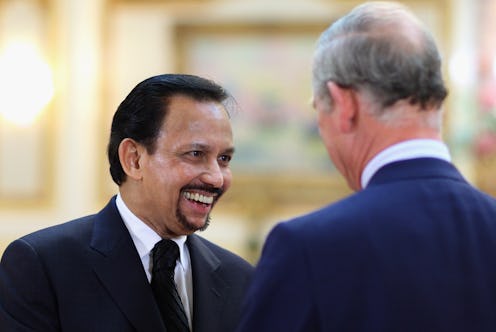News
Brunei Just Legalized Death By Stoning
A crowd has been gathering outside the Beverly Hills Hotel in California over the last few days, but not for the typical celebrity affair. Demonstrators have been lining up alongside the palm trees on Sunset Boulevard to protest the actions of Hassanal Bolkiah, who has introduced a stringent Sharia penal code in Brunei that primarily targets women and the LGBTQ community. Bolkiah is the hotel's wealthy owner, and is also the sultan of Brunei — which is now the first country in East Asia to enforce Sharia law.
Brunei's Sharia penal code will go through a three-step process, the first of which began May 1. The first phase instates fines and imprisonment for a variety of offenses, including out-of-wedlock pregnancies and indecent behavior. The second phase will introduce harsher penalties, including flogging and the severing of limbs, for acts such as theft and robbery. In 2015, the third phase will authorize death by stoning as a punishment for adultery, sodomy and gay relationships.
Women who have abortions will also be publicly flogged under these new laws, while blasphemy and drinking alcohol will become illegal. A Catholic priest in Brunei told The Independent that baptisms may also be in violation of the new measures, which prohibit religions other than Islam. Currently, Brunei is home to roughly 30,000 Filipinos, most of whom are Catholic.
Many celebrities and activist groups have publicly renounced their support of the Beverly Hills Hotel, including the Feminist Majority Foundation, which was going to host its Global Women's Rights Awards there May 5.
"We cannot hold a human rights and women's rights event at a hotel whose owner would institute a penal code that fundamentally violates women's rights and human rights," FMF President Eleanor Smeal said in a statement.
The Sultan of Brunei also owns the high-end Hotel Bel-Air in Los Angeles, the 45 Park Lane in London and the Le Meurice in Paris, among others. The luxury establishments are ran under his hotel group, the Dorchester Collection.
Sharia law has long been a controversial issue among international human-rights groups and Western and Middle Eastern leaders. The Islamic law influences both moral and judicial policy in most Muslim nations, though the degrees of the legal codes can vary greatly — especially when it comes to criminal punishment.
According to the Council on Foreign Relations, punishments of flogging, stoning, amputation and execution for offenses such as adultery and out-of-wedlock pregnancies garner a ton of media attention, but are not practiced in most Muslim countries, even if they may still be on the books. For instance, research from the Thomas Reuters Foundation shows that stoning is authorized in 15 countries, but is only legally practiced in Iran, Pakistan and Somalia. Countries such as the Sudan, Saudi Arabia and Yemen have sentenced citizens to death by stoning, but no executions have been reported.
Currently, only a handful of Muslim countries, such as Iran, Saudi Arabia and the Sudan, use Sharia law in criminal proceedings. But many countries, including those in Southeast Asia, apply aspects of Sharia law in their policies. Islamist activists in Indonesia and Malaysia are currently looking to implement a Sharia penal code like their neighbor Brunei. The Indonesian province Aceh has begun passing more conservative laws over the last few years, such as a ban on women straddling motorcycles. However, no criminal punishments in Southeast Asia are as draconian as Brunei's recently passed codes.
Still, the spread of harsh Sharia punishments across the region is raising concerns among many LGBTQ activists. According to a spokesperson from the Asia Pacific Coalition on Male Sexual Health, the rights, health and livelihood of women and gay and transgender people in the region are not only in danger, but may get worse.
Provisions in the Penal Code sparked concern from the ASEAN and the broader international community as it may open the floodgates for further human rights violations against women, children, and other people on the basis of sexual orientation and gender identity (SOGI).
